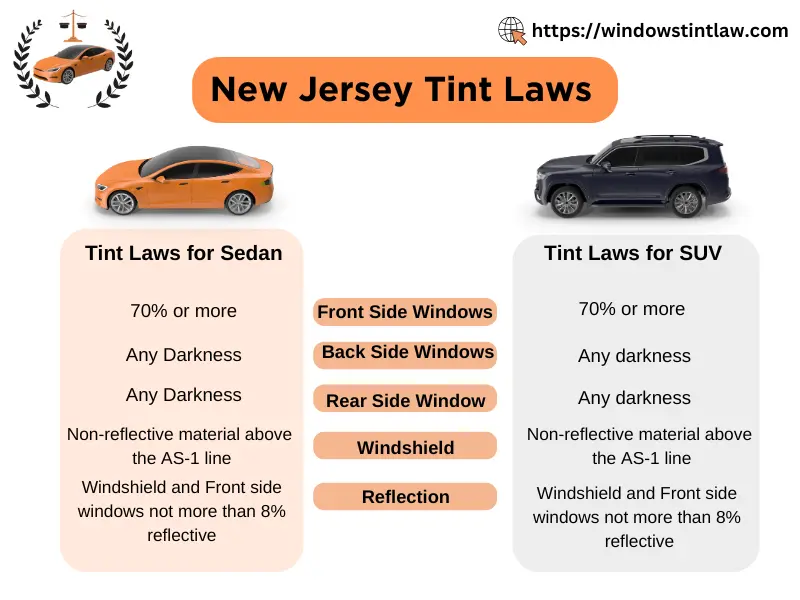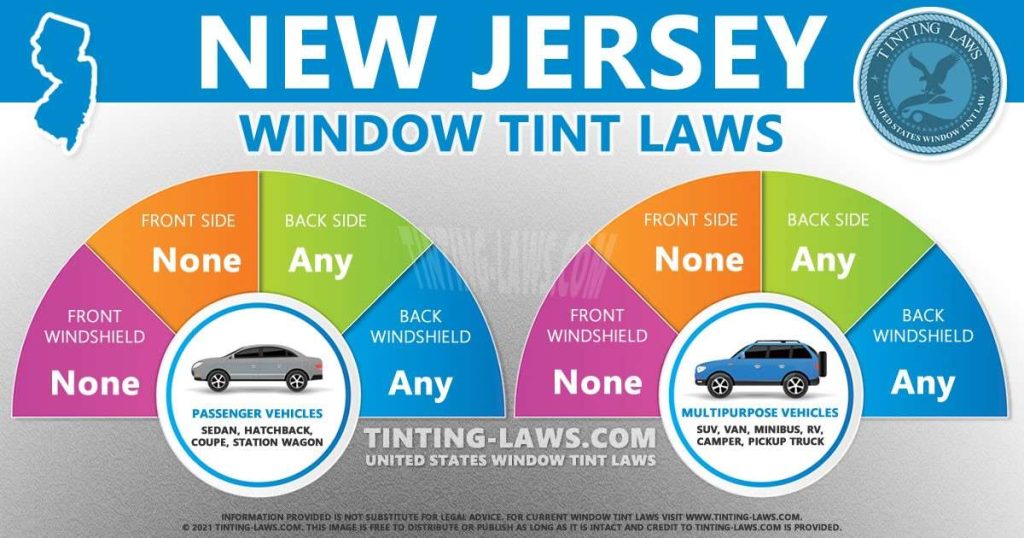Are you considering tinting your car windows in New Jersey? If so, understanding the state’s tint laws is crucial.
New Jersey has specific regulations that dictate how dark or reflective your car windows can be. These laws are designed to ensure safety on the roads while offering some flexibility for personal preference. Navigating these rules might seem daunting, but don’t worry—this guide will break them down for you in simple terms.
Discover how you can stay compliant without sacrificing style or comfort. You’ll learn exactly what’s allowed, what’s not, and how these regulations can impact your driving experience. Stay with us, and ensure your ride is both stylish and legal.
New Jersey Tint Law Overview
New Jersey’s tint law is essential for drivers. It ensures safety and compliance. Understanding the regulations can help avoid penalties.
Tinted windows offer privacy and style. But, they must follow state rules. The law defines permissible levels of tint. It protects drivers and passengers from accidents.
What Is Allowed?
Front windows cannot have tint. They must be clear. The rear windows can have tint. But not too dark. The law specifies the percentage. This percentage is called the VLT.
VLT stands for Visible Light Transmission. It measures how much light passes through. New Jersey sets limits to ensure visibility. Compliance is crucial for safe driving.
Penalties For Non-compliance
Violating tint laws leads to fines. The police may issue tickets. Fines can be costly. Fixing illegal tint is required. Repeat offenses increase penalties.
Keeping within the legal limits avoids trouble. Checking your tint regularly is wise. Ensure your vehicle meets state standards. Stay informed to avoid issues.
Reasons For Tint Regulation
Safety is the main reason. Tinted windows affect visibility. Poor visibility increases accident risk. The law ensures drivers see clearly.
It also aids law enforcement. Officers need to see inside vehicles. Tint regulations help them do their job. This promotes public safety. These rules protect everyone on the road.
Legal Tint Levels
Understanding New Jersey’s tint law is crucial for vehicle owners. The law outlines specific legal tint levels for different car windows. Knowing these regulations helps you avoid fines and maintain safety. Let’s explore these legal tint levels in detail.
Windshield Regulations
The windshield must allow over 70% of light through. Tinting is only permitted on the top six inches. This ensures clear visibility for drivers.
Front Side Windows
Front side windows must also allow over 70% light in. This rule ensures drivers have a clear side view. Proper visibility aids safe driving.
Back Side Windows
Back side windows have more relaxed rules. Any tint darkness is legal on these windows. This provides privacy for passengers.
Rear Window Standards
Rear windows can have any tint darkness. When using dark rear tints, dual side mirrors are required. This ensures rear visibility remains intact.
Exemptions And Special Cases
New Jersey’s Tint Law includes exceptions for certain medical conditions. Individuals with a doctor’s note may be allowed darker window tinting. These exceptions aim to balance legal compliance with personal health needs.
Navigating the New Jersey Tint Law can be a bit tricky, especially when it comes to understanding the exemptions and special cases. These rules ensure that while the law maintains road safety, it also accommodates unique situations. Whether it’s for medical reasons or specific vehicle types, knowing these exceptions can help you stay compliant and avoid unnecessary fines.Medical Exemptions
Did you know that New Jersey allows medical exemptions for window tinting? If you have a medical condition that necessitates additional protection from the sun, you might qualify for an exemption. Conditions like lupus or other skin disorders often require less exposure to UV rays. To secure this exemption, you need a certified document from your physician. This document must specify your condition and why the tint is necessary. Once you have it, you can apply through the Motor Vehicle Commission. However, keep in mind that this doesn’t mean you can go wild with tinting. Even with an exemption, there are still specific limits to adhere to. Regular checks ensure that your tint levels remain within the authorized range.Commercial Vehicle Regulations
Commercial vehicles often have different needs compared to personal cars. They may require additional tinting for privacy or to protect goods from sunlight. New Jersey recognizes this and provides more lenient rules for commercial vehicles. If you drive a commercial vehicle, you might have noticed that the tint regulations differ slightly. For instance, rear windows can have darker tints compared to personal vehicles. This flexibility helps in safeguarding valuable merchandise and enhancing privacy. But how do you ensure your vehicle complies? Regularly reviewing and understanding these rules is crucial. It’s always a good idea to consult with a professional when applying or modifying tint on commercial vehicles. Are these exceptions something you might qualify for? Understanding these nuances not only keeps you legally safe but also caters to your specific needs. Explore these options and see how they might make your driving experience more comfortable and compliant.
Credit: windowstintlaw.com
Consequences Of Non-compliance
Driving with tinted windows in New Jersey requires careful attention. Non-compliance with tint laws can lead to serious consequences. Understanding these repercussions helps avoid unnecessary trouble.
Fines And Penalties
Ignoring tint laws can result in fines. Police officers may issue tickets. These fines can be expensive, affecting your finances. Repeat offenses might increase penalties. Paying fines can be a burden. Staying compliant saves money and stress.
Impact On Vehicle Inspection
Tinted windows can cause inspection failures. Inspection checks ensure your vehicle meets state regulations. Non-compliant tints may lead to failed inspections. A failed inspection means you must correct the issue. This can delay driving and add costs. Ensuring your tints meet legal standards helps pass inspections smoothly.
Tips For Staying Compliant
Understanding New Jersey tint laws is crucial to avoid fines. Ensure your vehicle windows meet legal tint percentages. Regularly check updates on tint regulations to stay compliant.
Staying compliant with New Jersey’s tint laws is essential for avoiding fines and ensuring your safety on the road. It can be challenging to navigate the rules, but with the right approach, you can enjoy the benefits of window tinting without breaking the law. Consider these practical tips to keep your vehicle within legal limits and enhance your driving experience. ###Choosing The Right Tint
Selecting the correct tint is crucial. In New Jersey, the law restricts the Visible Light Transmission (VLT) percentage. The front side windows must allow more than 70% of light in, while the back side and rear windows can be darker. When choosing tint, ensure it meets these requirements. A friend once picked a tint too dark for his front windows, resulting in a hefty fine. Make sure you understand the specific percentages allowed before making a choice. ###Consulting Professionals
Professional advice can be invaluable. Visit a reputable window tinting service that is familiar with New Jersey’s regulations. Experts can guide you on the best options and ensure proper installation. A professional installer once told me about a client who insisted on a darker tint, despite warnings. They were ticketed soon after. Consulting with experts can save you from similar mistakes. Professional installers often offer warranties that guarantee compliance with state laws. This provides peace of mind and ensures your tint remains legal over time. Staying compliant doesn’t have to be complicated. Have you considered the benefits of consulting a professional for your tinting needs? Choosing the right tint and seeking expert advice can make all the difference in staying within the law and enjoying your ride.
Credit: www.tinting-laws.com
Updating Tint Regulations
New Jersey updates its tint law to ensure safer driving conditions. The new regulations focus on permissible window tint levels. These changes aim to enhance visibility for drivers and law enforcement.
Updating the tint regulations in New Jersey has been a hot topic for both drivers and lawmakers. With changes happening frequently, it’s crucial to stay informed to avoid fines and keep your vehicle in compliance. Understanding these updates can make your driving experience smoother and ensure you’re not caught off guard.Recent Changes
New Jersey recently adjusted its window tint laws to better balance driver privacy with safety concerns. The new regulations specify that front side windows must allow more light in, increasing the visibility for law enforcement and other drivers. This change aims to reduce accidents caused by poor visibility and enhance road safety. One significant update permits higher tint levels for rear windows, offering more flexibility for vehicle customization. This change is a nod to drivers who value privacy and aesthetics. The law now also recognizes medical exemptions, allowing those with specific health conditions to have darker tints. Have you ever been pulled over because of your car’s tint? Understanding these recent changes can help you avoid such situations and keep your driving record clean.Future Considerations
As technology advances, New Jersey is considering future updates to its tint laws. These might include integrating smart tint technology, which can adjust transparency based on lighting conditions. This innovation could offer a dynamic solution, merging safety with personal preference. Environmental concerns are also shaping future regulations. Tints that reduce heat inside the vehicle are gaining attention for their potential to decrease air conditioning use and fuel consumption. Lawmakers are exploring how these eco-friendly tints can be incorporated into future laws. Imagine a world where your car adapts to the environment, enhancing your comfort while reducing your carbon footprint. Would you be interested in such a feature? Staying informed about these potential changes can prepare you for upcoming shifts in regulations. It’s not just about following the law; it’s about embracing new technology and being part of a more sustainable future.
Credit: thetintlaws.com
Frequently Asked Questions
What Is The Darkest Legal Tint In Nj?
In New Jersey, the darkest legal tint for the front side windows is 70% VLT. Rear windows and back windshield have no tint restrictions. Always ensure compliance with local regulations to avoid penalties.
Is 20 Percent Tint Legal In Nj?
In New Jersey, 20 percent tint is illegal for the front side windows. The rear windows can have any tint darkness. Always ensure compliance with local regulations to avoid fines.
In What State Is 20% Tint Legal?
20% tint is legal in states like Michigan, Minnesota, and Montana for rear windows. Always verify local regulations for accuracy.
Is Tint Legal In New Jersey 2025?
Tint laws in New Jersey restrict front windshield tinting. Front side windows must allow over 70% light. Rear windows and back windshield can have any tint level. Check local regulations for updates. Always ensure compliance to avoid fines.
Conclusion
Understanding New Jersey’s tint law is crucial for drivers. Complying ensures safety and avoids penalties. The rules protect visibility, keeping roads secure. Stay informed on changes to stay compliant. Check your tint levels regularly. It’s a small effort for peace of mind.
Legal tinting enhances driving experience without risk. Consider professional services for accurate installation. Following the law benefits everyone on the road. Safe driving starts with legal tinting. Respect the regulations for a smoother journey. Always prioritize safety and legality. This knowledge empowers responsible driving.
Enjoy the benefits of lawful tinting.
